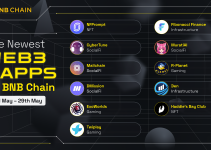Today marks the two-year anniversary of Binance’s partnership with Trust Wallet, one of the leading cryptocurrency wallets with more than 5 million users since Trust Wallet was acquired on July 31, 2018.

Trust Wallet allows anyone to buy, store, track, exchange and earn crypto in a trusted, decentralized crypto wallet. The crypto landscape has changed dramatically over the past two years, and in particular, interest in decentralized finance, or DeFi, has grown tremendously. Trust Wallet has kept pace, continually evolving its feature-set with an unwavering commitment to providing a premium user experience that prioritizes ease of use.
Viktor Radchenko, the founder of Trust Wallet, started with a simple mission: to make crypto accessible to everyone in the world, and allow users to have self-custody over their money and access decentralized services with no registration. Today, the DeFi movement is booming, and Trust Wallet’s mission is more relevant than ever.
Trust Wallet origins
Viktor has always been drawn to technology, but his arrival in the US after leaving his home country of Ukraine sparked another interest: coding. A newfound desire to build software that could scale. Channeling this passion, Viktor was determined to start building. The first large product he created was based on a problem he found when talking to a neighbour. It was simple: truck drivers were always struggling to find parking.
Viktor and a co-founder took this problem and initially created an application that truck drivers could use to find parking, truck stops, wait stations, and much more. Naturally over time this product progressed and scaled as new problems appeared. $20 million was raised in funding, and Viktor eventually moved on to pursue other problems. After Viktor left, the company was sold and still continues to operate under a different business.
Finding crypto
Everyone in crypto has a discovery story and Viktor is no exception. He first heard about crypto in 2012 when someone who lived in the same apartment complex showed Viktor how he was buying drugs on the internet using Bitcoin. Back then, it was cool to learn about this new payment method, but no further interest was shown.
Flash forward to 2014, one of Viktor’s friends joined BRD wallet. He was deep into the cryptocurrency world at a time that not many people were. Naturally, Viktor learnt a lot from his friend about cryptocurrency and why it mattered, which resulted in Viktor purchasing some Ethereum around the time of the ICO, which was then forgotten about.
Slightly later on, Viktor accompanied his friends to Devcon, at which there were numerous crypto meetups. Here Viktor discovered more about cryptocurrency and also remembered the Ethereum he had previously bought. This trip was what really instigated Viktor’s interest in cryptocurrency. Before long he was taking part in lots of different ICOs and he found a new problem: there was no easy way to manage all of the ERC-20 tokens he had.
A natural solution to this problem for a mobile developer was to build something. In 2017, Viktor built an open-source mobile crypto wallet in about three weeks that could send and receive Ether and ERC-20 tokens. He encouraged his friends and network to download it and soon had 200+ users. The initial Trust Wallet users loved the feature, coined ‘automagically’ tokens, which would find and show any ERC-20 tokens associated with your address. This was a game-changer back then. Other crypto wallets weren’t doing this.
Growth and acquisition
Wallet development began in September 2017, and 6 months later, Viktor left his full-time job to work on Trust Wallet round the clock due to an inundation of feature and support requests.
When the team was only two or three members strong, the need to raise money was already apparent. Wallets aren’t large money makers, so Viktor started thinking about ways to raise money while maintaining the integrity and vision of Trust Wallet. Naturally a token sale was considered, but during the planning conversations Binance took the upper hand. After Viktor met with CZ, he realized the deal had to be done. He was incredibly impressed with CZ’s professionalism, knowledge and drive to succeed. Viktor knew Binance would be able to give Trust Wallet the runway it needed to continue growth and improve the crypto ecosystem, while also taking away the burden and distraction of non product-related tasks such as HR.

The future of Trust Wallet
When this all began, there was no intention of reaching millions of people around the globe – Viktor was simply building an ERC-20 wallet for personal use. It started with a problem which prompted a solution. Now, new challenges continue to appear for crypto users worldwide, and Trust Wallet is still growing and innovating. Since its acquisition, Trust Wallet has added highly requested features like buying crypto with cards, DEX integration, and staking. Through Trust Wallet’s DApp browser, users are able to access all Web3 decentralized applications from a single interface, and explore the vast landscape of DeFi apps.
Today, Trust Wallet supports 40+ blockchains including Bitcoin, Binance Chain, XRP, and more. Meanwhile, initiatives like Block Atlas and the open-sourcing of Trust Wallet Core enable further transparency and collaboration within the blockchain space, providing access to blockchain data and enabling developers to easily build new DApps, integrations, and projects to expand the crypto ecosystem.
Trust Wallet’s top priority is not just growth. It is to make cryptocurrency more accessible and make crypto adoption a reality for more than 100 million users. There is a constant drive to find new solutions to problems that can make crypto easier to use for the average person. Whether it’s simpler wallet addresses, easier (or even keyless) key management, smoother fiat on-ramps, or native lending functionality, Viktor and the Trust Wallet team are constantly innovating to advance the wallet and the crypto ecosystem.

Follow Trust Wallet on Twitter to stay updated on new features and announcements from the most trusted and secure crypto wallet.


